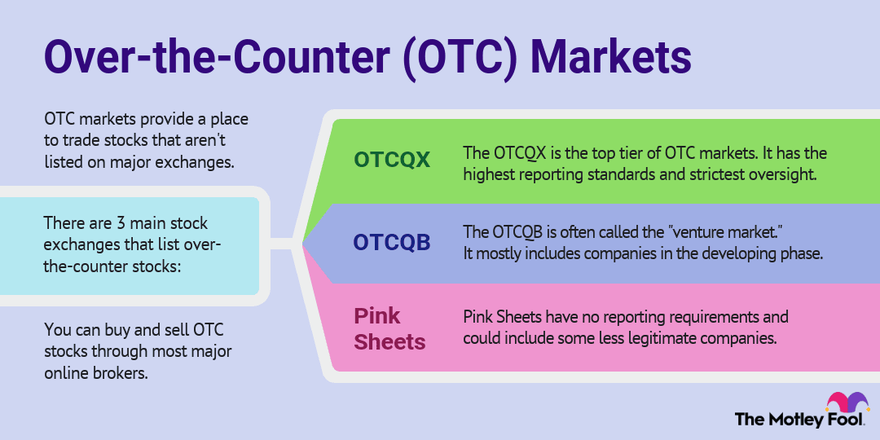Over-the-counter (OTC) trading has emerged as a significant aspect of South Africa’s financial markets, facilitating seamless transactions beyond the confines of traditional exchanges. Unlike exchange-traded markets, OTC trading connects buyers and sellers directly, offering flexibility and customized trading options. This article delves into the intricacies of OTC trading in South Africa, exploring its definition, history, current practices, and potential benefits.

Image: www.simplypsychology.org
The Fundamentals of OTC Trading
OTC trading refers to decentralized trading that takes place directly between parties, without the involvement of a centralized exchange. This market typically deals with large-volume transactions and offers greater flexibility compared to exchange-traded markets. OTC participants can negotiate contract terms, including price, quantity, and settlement date. This flexibility makes OTC trading attractive for complex financial instruments and tailored investment strategies.
History of OTC Trading in South Africa
OTC trading in South Africa has a long and established history, dating back to the early days of the country’s financial markets. Initially, OTC trading primarily involved foreign exchange and money market transactions. Over time, it has evolved to encompass a wider range of financial instruments, including bonds, equities, and derivatives.
OTC Trading in Practice
OTC trades are typically executed through a network of broker-dealers who act as intermediaries between buyers and sellers. These brokers facilitate communication, negotiation, and transaction settlement. OTC trading platforms also provide a venue for brokers to connect with each other, enabling them to execute trades efficiently. In South Africa, the OTC market is regulated by the Financial Sector Conduct Authority (FSCA), ensuring transparency and market integrity.

Image: www.youtube.com
Advantages of OTC Trading
- Flexibility: OTC trading allows for customized transactions tailored to specific requirements.
- Privacy: OTC trades are not publicly disclosed, which can be beneficial for sensitive transactions.
- Access to Unique Instruments: OTC markets offer access to a wide range of financial instruments that may not be available on exchanges.
- Large Volume Transactions: OTC trading is suitable for large-volume transactions that may not be practical on exchanges.
Latest Trends in OTC Trading
The OTC trading landscape in South Africa is constantly evolving, driven by technological advancements and regulatory changes. One notable trend is the rise of electronic trading platforms, which have streamlined the trading process and increased efficiency. Additionally, the adoption of distributed ledger technology (DLT) is expected to further revolutionize OTC trading, offering enhanced transparency, security, and settlement speed.
Tips and Expert Advice for OTC Traders
Navigating the OTC trading landscape effectively requires a strategic approach and informed decision-making. Here are some valuable tips to enhance your OTC trading experience:
- Conduct Thorough Research: Gather comprehensive information about the instruments you intend to trade, including their market dynamics, liquidity, and risk profile.
- Choose a Reputable Broker: Partner with a reputable and licensed broker-dealer who can provide guidance, execution services, and risk management support.
- Negotiate Favorable Terms: Don’t hesitate to negotiate contract terms, including price, quantity, and settlement terms, in your best interests.
- Manage Risk Prudently: Implement sound risk management strategies to mitigate potential losses, including setting stop-loss orders and diversifying your portfolio.
By following these tips, OTC traders can increase their chances of success in this dynamic and potentially lucrative market.
Frequently Asked Questions about OTC Trading
- Q: What are the risks associated with OTC trading?
A: OTC trading involves market risk, liquidity risk, and counterparty risk. - Q: How is OTC trading regulated in South Africa?
A: The OTC market in South Africa is regulated by the Financial Sector Conduct Authority (FSCA). - Q: What types of financial instruments can be traded OTC?
A: OTC markets offer a wide range of financial instruments, including bonds, equities, derivatives, currencies, and commodities. - Q: Is OTC trading suitable for all investors?
A: OTC trading may not be suitable for all investors due to its inherent risks and complexity.
Otc Trading South Africa
Conclusion
OTC trading has become an integral part of South Africa’s financial markets, offering a flexible and customized alternative to exchange-traded platforms. Understanding the dynamics of OTC trading, leveraging expert advice, and navigating the market strategically can empower investors to capitalize on the opportunities and mitigate the risks associated with this dynamic market.
Are you interested in learning more about OTC trading in South Africa? Share your questions and insights in the comments section below.






